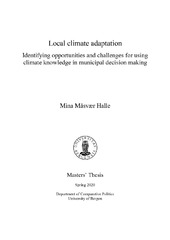Local climate adaptation - Identifying opportunities and challenges for using climate knowledge in municipal decision making
Master thesis
Permanent lenke
https://hdl.handle.net/1956/23903Utgivelsesdato
2020-08-28Metadata
Vis full innførselSamlinger
- Master theses [113]
Sammendrag
The usability of climate knowledge for decision makers has proved problematic. The often discussed usability gap occurs because of a discrepancy of what climate scientist perceive to be useful information and what decision makers view as usable (Lemos, Kirchhoff, and Ramprasad 2012). This thesis investigates the role of knowledge in local decision making on climate adaptation. It identifies opportunities and challenges for using knowledge for decision making in Bergen municipality. A case study of how Bergen municipality works on this issue, provides insight on how administrative employees and politicians in a large municipality acquire and employ knowledge for climate adaptation work. Through an integrated theoretical framework, based on approaches of wicked issue, knowledge regimes and co-production, opportunities and challenges for employing knowledge for this purpose will be discussed. It is argued that a qualitative case study based on interview data provides valuable insight on incentives and behaviors of individuals, within the context where knowledge utilization and decision making behavior occurs. The results show that a lack of invested interests in the issue is not a viable explanation for knowledge going unused, it seems that challenges of time, quantities of information and uncertainty may be more feasible explanations. Moreover, levels of political conflict are identified. In addition, the study finds that much knowledge is located within the municipality as well, giving them the opportunity to not merely be users of knowledge, but act as providers of information to other actors.
